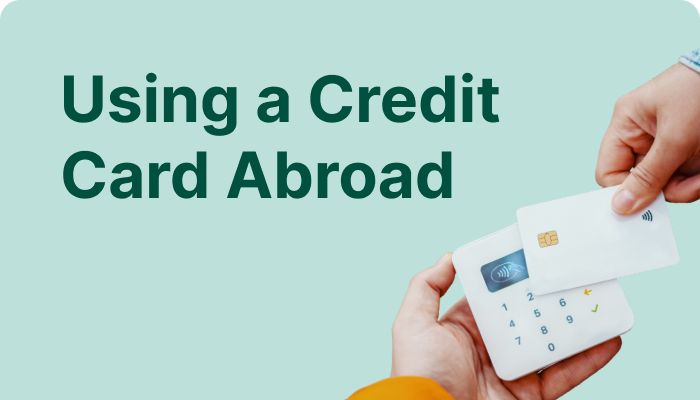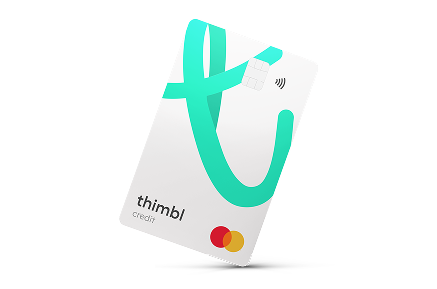Using a Credit Card Abroad
Joe Lytwyn | 15/10/24

If you’re jetting off on holiday, you might have given some thought to different payment methods you might use overseas - will you be paying for the ice-creams with cash or putting that delicious tapas meal on your credit card? How do you know what will be the more cost-effective, safest, or convenient choice? thimbl is here to help, as we bring you the ultimate guide to using a credit card abroad.
The advantages and disadvantages of using a credit card abroad
From purchase protection to credit card charges, thimbl looks into the reasons for and against using your credit card abroad.
| Reasons why you might consider using a credit card abroad | Things to be aware of when using a credit card abroad |
| Using cash could be considered ‘fiddly,’ leaving you with handfuls of change that you might struggle to get rid of at the end of your holiday. | It’s very likely that you’ll be charged fees for using a credit card abroad when making transactions or withdrawing money from a cash machine. We’ll talk about credit card charges in more detail later. |
| Even when using a credit card abroad, most purchases with a value between £100 and £30,000 are protected under Section 75 of the Consumer Credit Act 1974. | Some people find that withdrawing a set amount of cash helps them stick to a budget, particularly when travelling. Using a credit card abroad instead of relying on cash could make holiday budgeting more of a challenge. |
| Credit cards are generally globally accepted as a method of payment, although this will depend on the country you’re visiting, your credit card provider, and the terms and conditions of your credit card account. | If you’ve committed to using a credit card abroad, you might have issues if retailers only accept cash payments. |
It’s worth noting that there may be restrictions and limitations on using a credit card in certain countries, such as Cuba. You should check with your credit card provider before you leave, and you can keep up to date with the latest travel information on the Gov.uk website.
The cost of using your credit card abroad
In most cases, unless you have a credit card with no foreign transaction fees, you will be charged for using a credit card abroad.
- Foreign exchange fees
Foreign exchange fees may also be referred to as ‘non-sterling transaction fees.’ This is the amount charged for converting the currency each time you use your credit card abroad. The exact cost will vary, but is usually between 1% and 3% of the purchase price.
Here’s an example of how it works
- You use your credit card to make a purchase in local currency to the value of €50, with a card exchange rate of 2.75%.
- €50 converted into pounds sterling is approximately £42.49.
- The total amount you’ll be charged in pound sterling is £43.66, including the currency conversion fee.
- This equates to credit card charges of £1.17.*
We used the Santander fee calculator to work out the above. Example is for illustrative purposes only. Fees will vary across different credit cards and providers. Exchange rate is subject to change, and figures were correct as of July 2024.
- Cash withdrawal fees
Just like in the UK, using your credit card to withdraw cash from a cash machine overseas may incur charges. The percentage charged will be based on the amount of money you withdraw.
Credit card charges when paying in sterling vs. paying in local currency
When using a credit card abroad, you will usually be presented with two options:
- Pay in local currency; or
- Pay in pounds sterling.
While you may well be more familiar with pounds sterling, opting to make your payment in local currency could save you money. This is because the retailer (for example, the café or shop you’re buying from) is able to set their own conversion rate. This may be higher than that charged by your credit card merchant (which is either Mastercard, Visa, or American Express).
On the other hand, when you choose to pay in local currency the rate is set by your credit card merchant. It’s worth noting that your credit card provider may charge additional fees on top of this.
Some retailers may assume that you want to pay in pounds sterling, but if you’d prefer to use local currency and are not given the option, you should ask the retailer if you can change this.
What are the best credit cards to use abroad?
There’s no definitive answer when looking into the best credit cards to use abroad, as the credit card that suits one person might not necessarily be a good match for somebody else.
If your aim is to save money when travelling, credit cards with no foreign transaction fees could be an option to explore. These credit cards are often known as ‘travel credit cards,’ and may even offer rewards on your spending, such as cashback or vouchers. You can use credit card comparison sites to find the best credit card to suit you and your circumstances.
You’ll need to meet the eligibility criteria before you apply for a travel credit card. Criteria varies between providers, but you’ll usually need to be:
- Over the age of 18;
- A UK resident;
- Have a UK bank account;
- Have a regular source of income; and
- Have a good credit score.
Some credit card providers will also require you to have three years’ UK address history.
Can I use a thimbl credit card abroad?
The thimbl credit card comes with a personalised starting credit limit between £200 and £2,000 and can be used abroad in most countries with no additional transaction fees.*
You can check your eligibility for a thimbl Credit Card if you:
- Are between the ages of 18 and 70;
- Are a UK resident with at least 1 year's UK address history;
- Have a monthly net income of at least £800;
- Have an active credit account that has been open for a minimum of 12 months; and
- Do not already hold a Zable credit card.
Lendable Ltd is unable to consider applications from anyone who has declared bankruptcy or is on an individual voluntary agreement (IVA).
Lost or had your thimbl credit card stolen abroad? Click here to find out what to do next.
*Certain countries excluded. Please find a full list of exempt countries here.
How do travel credit cards work?
Spending on your travel credit card works in the same way as using a standard credit card – the only difference is that you will not have to pay any fees associated with overseas spending.
When you use your travel credit card to make a payment, the transaction will be automatically converted into pounds sterling based on the exchange rate set by the credit card merchant. This means that you won’t be stung by the high or unpredictable exchange rates set by individual retailers.
As with all credit cards, you should try to pay more than the minimum amount due on your outstanding balance each month, as this will reduce the amount of interest accrued. If you can comfortably afford to do so, paying your balance off in full each month, every month, could mean that you won’t be charged any interest.
Debit card vs. credit card abroad
When thinking about credit card charges abroad, you might be wondering whether it’s more practical to use a debit card instead.
Most debit cards will also be subject to fees, with most charging a flat rate per transaction. These rates will vary, so it’s best to speak directly with your debit card provider and ask the exact rate you will be charged.
Before you go
- Familiarise yourself with your credit card’s fees
- Check if you need to let your credit card provider know that you’re going abroad
- Make sure that your credit card isn’t due to expire while you’re away
- Consider a back-up payment option
- Don’t forget your monthly repayments
Before using a credit card abroad, take the time to carefully read through your credit card’s terms and conditions so you know what to expect in terms of foreign exchange and cash withdrawal fees. This will hopefully help to prevent any nasty surprises popping up on your bank statement following a credit card payment for your first night pizza.
You can use this tool on the MoneySavingExpert site to calculate how much you will pay when using a credit card abroad.
This can usually be done via your credit card account app and can help to prevent fraud detection being triggered as a result of your credit card being used in a new location. Any activity that is flagged as suspicious may result in your account being frozen.
When your current credit card expires, your provider will usually automatically issue you with a new one. If you’ve noticed that your credit card is due to expire while you’re away, you should contact your provider as soon as you can. They may be able to send out your replacement credit card early. Be sure to factor in the time it could take for the new credit card to arrive.
Hopefully you won’t need to worry about this, but if something were to happen and you were unable to use your credit card abroad (for example, your credit card was stolen or fraud was detected and your account was frozen), it’s important to have a back-up method to hand. The last thing you want is to be stranded overseas with no money. Your alternative may be your debit card, a prepaid travel money card, or cash.
Make sure you remember to cover any upcoming repayments on existing credit card balances that are scheduled, such as a Direct Debit, while you’re away.
After the holiday
When we’re in holiday mode, it can be easy to simply tap, go, and forget what we’ve spent.
Once you’re back, be sure to carefully check your balance, and remember to make at least the minimum repayment amount each month. Where possible, you should try to pay more than this, if you can.
Our Experts View
Joe Lytwyn, Head of Partnerships says,'For savvy travellers looking to save money, credit cards with no foreign transaction fees may be considered some of the best credit cards to use abroad, but of course, this is down to personal preference and your individual circumstances.
'If you’re hoping to keep costs down when using your credit card abroad, you may wish to consider paying in local currency, rather than pounds sterling. You should also try to avoid using your credit card to withdraw money from cash machines.'




